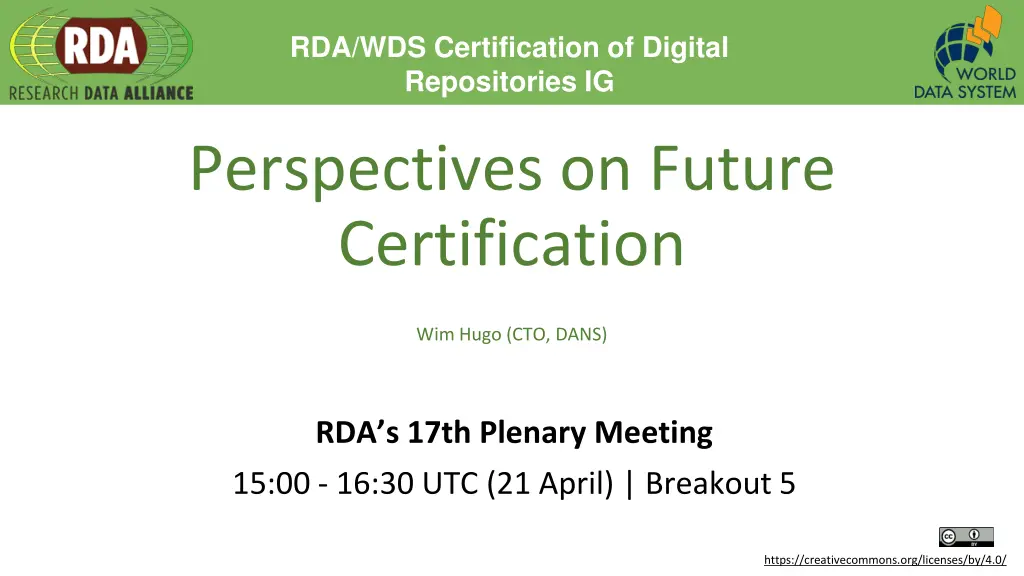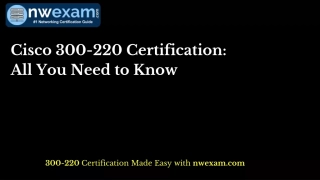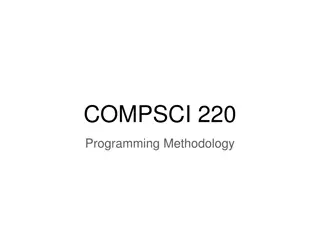
Digital Repositories Certification and Open Science Principles
Explore the perspective on future certification of digital repositories and the importance of open science principles such as TRUST, FAIR, and CARE. Learn about the key elements including transparency, responsibility, user focus, sustainability, findability, interoperability, and more. Discover how communities can benefit from a data ecosystem that respects Indigenous Peoples' rights and collective benefit. Join the call to action for implementing community expectations, best practices, and protocols in data development.
Download Presentation

Please find below an Image/Link to download the presentation.
The content on the website is provided AS IS for your information and personal use only. It may not be sold, licensed, or shared on other websites without obtaining consent from the author. If you encounter any issues during the download, it is possible that the publisher has removed the file from their server.
You are allowed to download the files provided on this website for personal or commercial use, subject to the condition that they are used lawfully. All files are the property of their respective owners.
The content on the website is provided AS IS for your information and personal use only. It may not be sold, licensed, or shared on other websites without obtaining consent from the author.
E N D
Presentation Transcript
RDA/WDS Certification of Digital Repositories IG Perspectives on Future Certification Wim Hugo (CTO, DANS) RDA s 17th Plenary Meeting 15:00 - 16:30 UTC (21 April) | Breakout 5 https://creativecommons.org/licenses/by/4.0/
Defining Open Science Open science is the movement to make scientific research (including publications, data, physical samples, and software) and its dissemination accessible to all levels of an inquiring society, amateur or professional. [4]
On a High Level, we have TRUST Principles Transparency To be transparent about specific repository services and data holdings that are verifiable by publicly accessible evidence. Responsibility To be responsible for ensuring the authenticity and integrity of data holdings and for the reliability and persistence of its service. User Focus To ensure that the data management norms and expectations of target user communities are met. Sustainability To sustain services and preserve data holdings for the long-term. Technology To provide infrastructure and capabilities to support secure, persistent, and reliable services [1]
Also, FAIR and CARE ! Findable Metadata and data should be easy to find for both humans and computers. Machine- readable metadata are essential for automatic discovery of datasets and services Once the user finds the required data, she/he needs to know how can they be accessed, possibly including authentication and authorisation The data usually need to be integrated with other data. In addition, the data need to interoperate with applications or workflows for analysis, storage, and processing. Collective Benefit Data ecosystems shall be designed and function in ways that enable Indigenous Peoples to derive benefit from the data. Accessible Authority to Control Indigenous Peoples rights and interests in Indigenous data must be recognised and their authority to control such data be empowered. Interoperable Responsibility Those working with Indigenous data have a responsibility to share how those data are used to support Indigenous Peoples self- determination and collective benefit. Reusable The ultimate goal of FAIR is to optimise the reuse of data. To achieve this, metadata and data should be well-described so that they can be replicated and/or combined in different settings. Ethics Indigenous Peoples rights and wellbeing should be the primary concern at all stages of the data life cycle and across the data ecosystem. [3] [2]
Call to Action Community Expectations Recommendations/ Best Practice TRUST FAIR OAIS- RM Several CTS Many .. ISO Metrics nestor (CARE )
... Call to Action Protocols Code Semantics Data Developing an globally accepted Architecture for TRUST, FAIR, and (CARE) that is integrated, measurable, covers all of shared scientific endeavour, and can be automated. DATA Covers Governance, Best Practices and Recommendations, Standards, Technology, Metrics
Common Challenges Open Science Documented, Global Architecture Automation and Crowdsourcing
Thanks! [1] Lin et al., 2020. The TRUST Principles for Digital Repositories. Scientific Data, https://doi.org/10.1038/s41597-020-0486-7 [2] Wilkinson, M., Dumontier, M., Aalbersberg, I. et al. The FAIR Guiding Principles for scientific data management and stewardship. Sci Data 3, 160018 (2016). https://doi.org/10.1038/sdata.2016.18 [3] Research Data Alliance International Indigenous Data Sovereignty Interest Group. (September 2019). CARE Principles for Indigenous Data Governance. The Global Indigenous Data Alliance. GIDA-global.org [4] Wikipedia: Open Science
Conceptual Model 1. The community expresses its requirements and expectations via sets of principles
Conceptual Model Typology Typology {Best Practice, Recommendation, ...} {TRUST, FAIR, CARE, } Community Aspirations, Requirements, & Needs Principles Criteria Standards Maturity Frameworks and Architecture(s) Metrics and Tests



